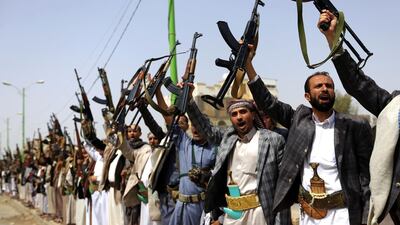"We support our partner Saudi Arabia's right to self-defence" but that support is "not unconditional": so said US defence secretary James Mattis on Tuesday at the Pentagon, where he reaffirmed America’s support for the Saudi-led coalition fighting to restore Yemen’s rightful government.
Mr Mattis acknowledged that US support for the coalition is dependent on doing “everything humanly possible” to avoid any loss of innocent life, adding that "we have not seen any callous disregard by the people we're working with, so we will continue to work with them". Compare that to the Iran-backed Houthi rebels, who have committed numerous atrocities in the lands they have occupied, prolonging and worsening the three-year war and launching hundreds of ballistic missiles towards Saudi Arabian soil.
Mr Mattis's remarks complemented those of Dr Anwar Gargash, UAE Minister of State for Foreign Affairs, who on Tuesday acknowledged the conflict's significant "political and humanitarian challenges". The coalition is united in pursuing peace, prosperity and stability in Yemen under the internationally recognised government of president Adrabu Mansur Hadi.
This aim has always been at the heart of the coalition’s mission. That is why it has the participation and support not just of Saudi Arabia and the UAE but of multiple governments across the world, from the US and UK to Sudan, as well as Nato itself.
The significance of UN Security Council Resolution 2216 calling on the Houthis to withdraw from the areas they seized is even greater with the renewed impetus to Yemen peace talks slated to start in Geneva on September 6.
Behind Dr Gargash’s comments is an important recognition that war is never simple while his acknowledgement that the coalition is open to scrutiny is indicative of the push towards a peaceful and durable conclusion to the conflict.
Meanwhile, the Houthis have shown no intention of ending the cycle of violence. Having occupied large swathes of land, including the capital Sanaa and the vital port city of Hodeidah, the rebels have entrenched themselves, planting up to a million landmines and imposing their reign of terror on the Yemeni people.
A political solution would not serve their long-term interests, which are shaped by grim self-preservation at the expense of a broken population.
The coalition is hopeful an agreement can be negotiated next week by Martin Griffiths, the UN special envoy for Yemen. Every day wasted in war is a day of loss for the people of Yemen. Its end cannot come soon enough.
If no progress can be made it will reveal the true colours of the Houthis, who have shown scant regard for the people of Yemen.
After three years of conflict, up to 10,000 people have been killed and millions displaced. The lives and livelihoods of millions more are riding on the vital talks in Geneva.

